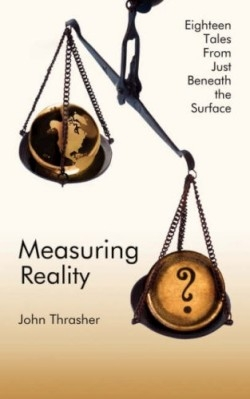Measuring Reality
Eighteen Tales From Just Beneath the Surface
The short stories in Measuring Reality recall Bradbury’s Medicine for Melancholy era as well as a Lovecraftian Gothic horror which rudely intrudes on characters living otherwise calm pedestrian lives. Carefully chosen language in fully fleshed out stories are the norm though a few are essentially vehicles for the presentation of imaginative concepts. The meaning of these stories typically pivots after a measure of foreshadowing. Themes are many: past and future affect each other; our narrow reality mislabels too much as impossible; mythical creatures are all about us. Idealizations slip and crumble here to amusing or disturbing conclusions based on altered logic. Thrasher demotes the current laws of physics to mere suggestions.
The limits of hypnotic regression are demolished in “Razing Georgie” as a fearful man learns to communicate directly with the bullied child he once was first “re-parenting” then feeding enough courage to change the present. Mr. Giles tells young Georgie “‘Wayne created Batman to do the things that Wayne could not….I can create a new person to do the things I can’t do and make him the man I am not. You can do the same.’”
“As If the Sea Could Breathe…” tells of a single-minded boy driven to become the world’s top expert on the nature of sound. His father sets him to the task by intentionally omitting a single but crucial word from a story read aloud causing a belief in an undiscovered beast under the ocean discernible by its deep noise of respiration. Years later with a Nobel Prize and a fortune to his name he discovers the omission and confronts his father’s ghost asking why the “lie.” The father answers: “The point of a quest is the quest itself.”
The early appearing B-movie screenplay “The Root of All Evil” along with the long penultimate story “Too Much T.V.” which features characters whose lives are submerged in that same movie’s reality together amount to a self-indulgence of nearly two hundred pages. They aren’t equal to the quality of the other stories. Even so they shed light on new forms of situational ethics as a character wrestles with changing a preset script he’s familiar with therefore saving some people from harm and throwing it onto others. The table of contents includes a smart extra: each story’s title is followed by the question that powers it or by a sharp one-liner which focuses interest.
John Thrasher practices law in Indianapolis “The Crossroads of America.” He best expresses the journey he underwent writing these tales through the thoughts of an accident claims adjuster who senses a huge secret in “Manuscript Found in a File Drawer”: “My search took me farther and farther from the Brothers Grimm into time theory and ideas so bizarre I had to hit the stacks on occult and myth again to make sense of them.” Considering how horrific and surreal this fiction gets Measuring Reality still makes a great deal of sense.
Disclosure: This article is not an endorsement, but a review. The publisher of this book provided free copies of the book and paid a small fee to have their book reviewed by a professional reviewer. Foreword Reviews and Clarion Reviews make no guarantee that the publisher will receive a positive review. Foreword Magazine, Inc. is disclosing this in accordance with the Federal Trade Commission’s 16 CFR, Part 255.

